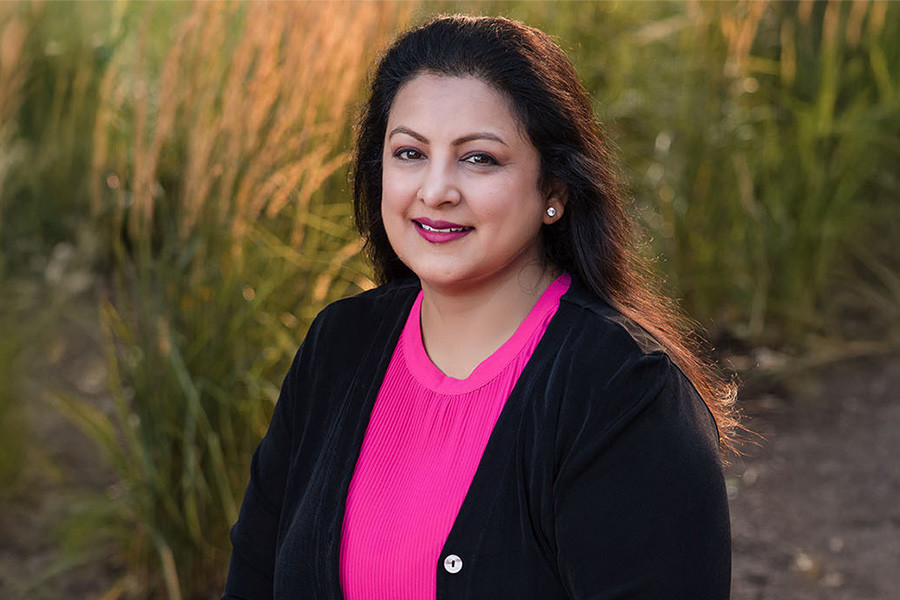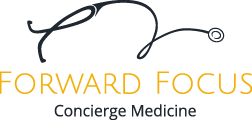Blog: Dr. Smriti Goel, MD - About Breast Cancer
Who is Smriti Goel, MD?
A long-time resident of Deerfield, Smriti Goel, MD, has practiced at Highland Park, Glenbrook, and Lutheran General Hospitals for many years. Dr. Goel lives with her husband and enjoys spending time with their two young adult sons and sprightly dog. Outside of medicine, she finds joy in yoga, meditation, classical dance, and walking along Lake Michigan or hiking in Starved Rock. She also has a strong interest in philanthropy and community engagement.
With over 25 years of experience in internal medicine, including two decades in solo practice, Dr. Goel brings extensive clinical expertise and a steady presence to her patients. She will be transitioning her private practice in Deerfield to Forward Focus Concierge Medicine Highland Park and will begin seeing patients in our new facility at 799 Central Ave. in January 2026. Dr. Goel was drawn to Forward Focus for its small, collaborative environment and the opportunity to offer longer visits, direct access, and the time and space to truly connect with her patients. Thoughtful, diligent, and compassionate, Dr. Goel specializes in comprehensive care of adults across all stages of life, preventive health, cardiovascular care, diabetes management, and mental health. One of the first poster presentations during medical training was on mammograms in underserved populations.
She is known for her ability to diagnose and manage complex medical situations, particularly when patients are dealing with multiple conditions and medications. She has built long-term relationships with trusted specialists in the community and is able to refer patients to the appropriate consultant when the need arises. She advocates for her patients and ensures that all care is coordinated and of the highest quality.
About Breast Cancer
Most of us have known someone who has fought breast cancer. One does not need to be in the medical field to be touched by this medical diagnosis. Breast cancer is the second most common cancer among women worldwide, after skin cancer. For an average woman in the United States, the overall lifetime risk of developing breast cancer is about 13%, or 1 in 8 chances, with variable outcomes based on a combination of factors. Being a woman over age 50 with a genetic/family history
could mean a double the risk. Women who started their menstrual periods early (before age 12) or entered menopause late (after 55) have a slightly higher risk due to longer lifetime exposure to certain hormones. Women with dense breast tissue can also make tumors harder to detect on mammograms.
There are risk assessment tools, such as the Tyrer-Cuzick model, that your doctor can use to give you a more accurate estimate. We know now that lifestyle-related risk factors are modifiable. Aside from creating a pro-oncogenic environment, obesity is related to an excess estrogen state. Hormone replacement therapy, especially after menopause, should be cautiously individualized. Breastfeeding is encouraged. Regular exercise has been shown to reduce breast cancer risk. Simply, the act of walking helps! You can be your own best friend in being proactive in early detection because breast cancer can often be curable when diagnosed at an early stage!
Regular breast cancer screenings, such as mammograms, clinical breast exams, and self-checks, can help with early detection.
If You See or Feel Something, Say Something!
Learn how to do self-exams and be on the alert for:
- Breast changes like a new lump or thickening in the breast, a change in the size, shape, or feel of the breast, redness, swelling, or pain in the breast
- Nipple discharge, change in the appearance, scaling, or crusting
- Skin dimpling or puckering of the breast, enlarged veins
- Axillary changes like a lump or swelling in the arm or armpit (lymph node enlargement)
- Other symptoms: bone pain, fatigue, and unexplained weight loss
Not all breast lumps are cancerous. However, it’s crucial to consult a healthcare professional if you notice any of these symptoms, as early detection and treatment are essential for improving outcomes. If abnormalities are suspected on initial evaluation, further testing is then recommended for definitive diagnosis.
Breast cancer treatment involves surgery (removal of cancerous tissue from the breast), radiation (high-energy rays to kill cancer cells), chemotherapy (drugs used to kill cancer cells, pills or IV), hormone therapy (blocks hormones that help certain breast cancers grow), and targeted therapies (drugs that target specific proteins or genes on cancer cells, making them more selective than traditional chemotherapy). These treatment plans are tailored to the individual’s specific cancer type,
stage, and overall health.
Education on the treatments should come from your healthcare team and guidelines from reputable organizations like the National Comprehensive Cancer Network (NCCN), Centers for Disease Control and Prevention (CDC), and National Cancer Institute (NCI). The guidelines provide evidence-based, consensus-driven guidance for cancer management to ensure that all patients receive preventive, diagnostic, therapeutic, and supportive services that are most likely to lead to optimal outcomes. Patients should also seek support from breast cancer survivors and consider a second opinion from a specialist if in doubt. Maintain a healthy weight, exercise regularly, eat a balanced diet, limit alcohol intake, quit smoking, and take care of your mental health. These are the basics that help you remain healthy and happy to the best of your ability throughout your health care journey.
Coping With Breast Cancer: Tools to Help You Live
- Keep track of your feelings
- Share your feelings with people close to you
- Seek individual counseling with a professional
- Join a support group and/or find a mentor
- Tell your doctor and nurse about your feelings
Organizations Providing a Broad Range of Support and Resources
- National Comprehensive Cancer Network (NCCN)
- Centers for Disease Control and Prevention (CDC)
- National Cancer Institute (NCI)
- American Cancer Society (1-800-227-2345)
- Susan G. Komen (1-877-GO-KOMEN)
- Cancer Support Community
- Gilda's Club Chicago
- Living Beyond Breast Cancer (LBBC)
- National Breast Cancer Foundation
- Cancer Wellness Center Northbrook, IL (847-509-9595)
- Breast Cancer Angels
- The Pink Fund
- Young Survival Coalition for Young Adults
- Sharsheret for Jewish Community
- African American Breast Cancer Alliance
- Cancer Care

